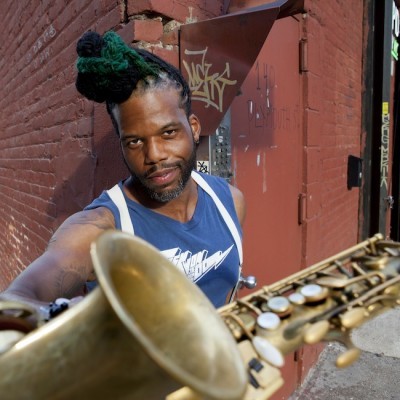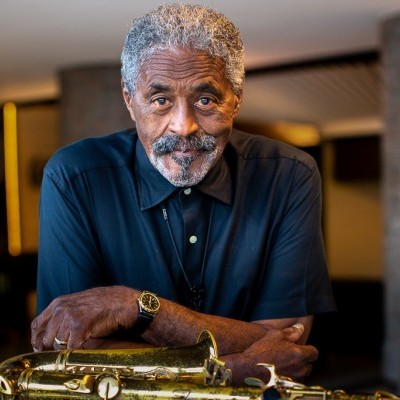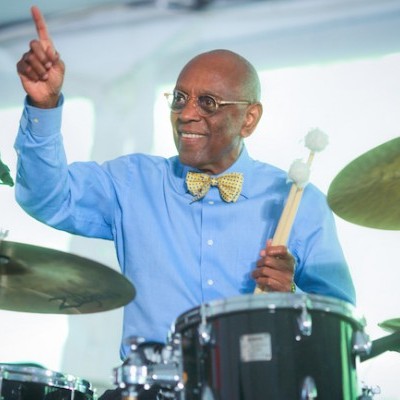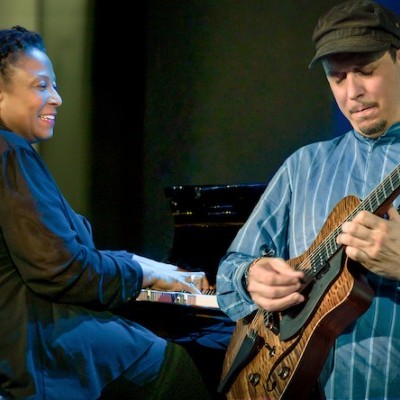Apr 2, 2024 12:59 PM
Saxophonist, Sonic Explorer Casey Benjamin Dies at 45
Casey Benjamin, the alto saxophonist, vocalist, keyboardist and producer who stamped his distinctive sounds on the…

Abigail Washburn and Béla Fleck have been livestreaming performances from their home in Nashville during the pandemic.
(Photo: Jim McGuire)Work and family gracefully coexist in the household of Béla Fleck and Abigail Washburn—married banjo players who frequently have toured and recorded together. And those threads of personal responsibilities and professional activities have become even more intertwined during the coronavirus pandemic.
On March 20, the musicians launched a weekly concert series, dubbed “Banjo House Lockdown,” which is livestreamed from their Nashville home. As the musicians prepared for these shows, they also were juggling parental duties for their son Juno, 7, and his brother, 2-year-old Theo.
When DownBeat visited their home on March 9, both musicians were eager to talk about their forthcoming concert tours—shows that now have been postponed due to the pandemic.
But each musician has plenty of irons in the fire. Fleck’s new release is Throw Down Your Heart: The Complete Africa Sessions (Craft), a compilation that includes three CDs and one DVD. The package features The Ripple Effect, a previously unreleased duo album with kora master Toumani Diabaté (which is also available as a standalone title). The DVD contains an expanded version of the documentary Throw Down Your Heart, which chronicles the banjoist’s 2006 musical trek through Mali, Uganda, Tanzania and other parts of Africa.
Washburn, meanwhile, has a new duo album, Wu Fei And Abigail Washburn (Smithsonian Folkways), a collaboration with longtime friend and renowned guzheng player Wu Fei, mixing Appalachian-style banjo and Chinese folk traditions.
Fleck, who produced the album, is accustomed to balancing career and family: “We look six months or more ahead to commit ourselves to doing concerts or recording. It’s amazing how hard that is, most of all with the kids. They’re the focus.”
“We’re getting better all the time at gauging that,” Washburn added. “For example, I’m about to take the kids to the University of North Carolina at Chapel Hill to finish off this scholarship [awarded by the Mellon Foundation] I’ve been doing. Meanwhile, Béla will stay here to mix his [recordings]. That’s a big change for us because usually we do try to stick together.”
The prep work for Fleck’s new compilation, which includes two albums originally released in 2009 and 2010, gave him a deeper understanding of African music traditions that he encountered during his five-week trip.
“I had bigger epiphanies through years of editing the recordings and the film,” he said.
His musical relationship with Diabaté was perhaps the most rewarding result of his trek. “He’s an incredible accompanist,” Fleck said. “He can make a bed that you can just sail on. The thing is, he’s not in a hurry to show off. I didn’t want to be the pig that does all the soloing. So, the trick is to bring him out, which I was able to do.”
Washburn—an Illinois native who is fluent in Mandarin—has cultivated a similar rapport with Wu Fei, a native of China who settled in Nashville with her husband. A grant from the region’s Metro Council helped finance their cross-cultural efforts, which led to surprising combinations of folk material from both of their respective cultures. The album’s lyrics are sung in English, Mandarin and other languages.
“We chose tunes based on themes and how they might connect harmonically,” Washburn explained. “But it was also about having a really close friendship—going through challenges at the same time as new mothers, trying to keep our careers going while loving our kids. That spirit made us really glad to have those moments of solace on the porch, asking each other, ‘What’s an amazing song that helps you put your child to sleep?’ And then combining them.”
“This really is the most Chinese-oriented thing you’ve ever done,” Fleck interjected, with obvious admiration. “This is the first time I’ve heard you go all the way in.”
The couple’s livestreamed concert series has given fans a chance to hear some brilliant music while peeking inside their home. To promote the series, Fleck issued a tongue-in-cheek statement during the lockdown: “Life without other people is fine, but life without banjos would be intolerable. So, we’re gonna sing and play our banjos to keep everyone from going batty.” DB
This story originally was published in the July 2020 issue of DownBeat. Subscribe here.

Benjamin possessed a fluid, round sound on the alto saxophone, and he was often most recognizable by the layers of electronic effects that he put onto the instrument.
Apr 2, 2024 12:59 PM
Casey Benjamin, the alto saxophonist, vocalist, keyboardist and producer who stamped his distinctive sounds on the…

“He’s constructing intelligent musical sentences that connect seamlessly, which is the most important part of linear playing,” Charles McPherson said of alto saxophonist Sonny Red.
Feb 27, 2024 1:40 PM
“I might not have felt this way 30 to 40 years ago, but I’ve reached a point where I can hear value in what people…

Albert “Tootie” Heath (1935–2024) followed in the tradition of drummer Kenny Clarke, his idol.
Apr 5, 2024 10:28 AM
Albert “Tootie” Heath, a drummer of impeccable taste and time who was the youngest of three jazz-legend brothers…

“Both of us are quite grounded in the craft, the tradition and the harmonic sense,” Rosenwinkel said of his experience playing with Allen. “Yet I felt we shared something mystical as well.”
Mar 12, 2024 11:42 AM
“There are a few musicians you hear where, as somebody once said, the molecules in the room change. Geri was one of…

Henry Threadgill performs with Zooid at Big Ears in Knoxville, Tennessee.
Apr 9, 2024 11:30 AM
Big Ears, the annual four-day music celebration that first took place in 2009 in Knoxville, Tennessee, could well be…